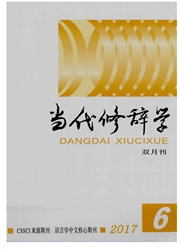

 中文摘要:
中文摘要:
“好说”在近代汉语中是个高频会话程式语,可以用作请求、恭维、致谢、致歉话语的回应语。它在现代汉语中主要用作请求回应语。本文考察了“好说”从非词向各种会话程式语的语用化。发现:请求回应语“好说”来源于“好说话”义短语“好说”。在其形成过程中,“好说”经历了如下语义演变:“好说话”〉“好沟通”〉“好商量”〉“没问题,好的”。其它回应语“好说”来源于“说得好”义短语“好说”。“说得好”义“好说”在元代因常用于反讽语境而获得“说得倒好,胡说”义,继而在明代经历了如下语义演变:“说得倒好,胡说”〉“说哪里的话”〉“哪里”。恭维回应语、致谢回应语和致歉回应语“好说”是“哪里”义“好说”向恭维、致谢、致歉语境扩散并固化的结果。
 英文摘要:
英文摘要:
In pre-modern Chinese, haoshuo is a conversational fi used as a response to requests, compliments, acknowl ormula, which can be ogies. In modem Chi- nese,it is mainly used as a response to requests. This paper investigates the pragmaticalization of haoshuo from a provisional expression to a conventional expression in dialogues. It is found that haoshuo lexicalized from the phrase haoshuo meaning easy to talk with. During its devel- opment, haoshuo has undergone the following semantic change: easy to talk with ~easy to communicate with〉easy to talk over~Ok, no problem. Haoshuo as a response to other sorts of discourses derived from the phrase haoshuo, which means speak well. Haoshuo meaning speak well appeares in ironic utterances frequently, absorbing its contextual implicature, i.e., talk without truth, talk wet as its literal meaning. Then it underwent the following semantic change in Ming Dynasty: talk without truth, talk wet 〉you are being too modest:〉 not at all. Haoshuo as a response to compliments, acknowledgements or apologies, pragmatiealized from haoshuo meaning not at all, based on speaker is complimented, thanked or apo the latter's expansion to the context in which the logized to, and based on the fossilization of the latter.
 同期刊论文项目
同期刊论文项目
 同项目期刊论文
同项目期刊论文
 期刊信息
期刊信息
